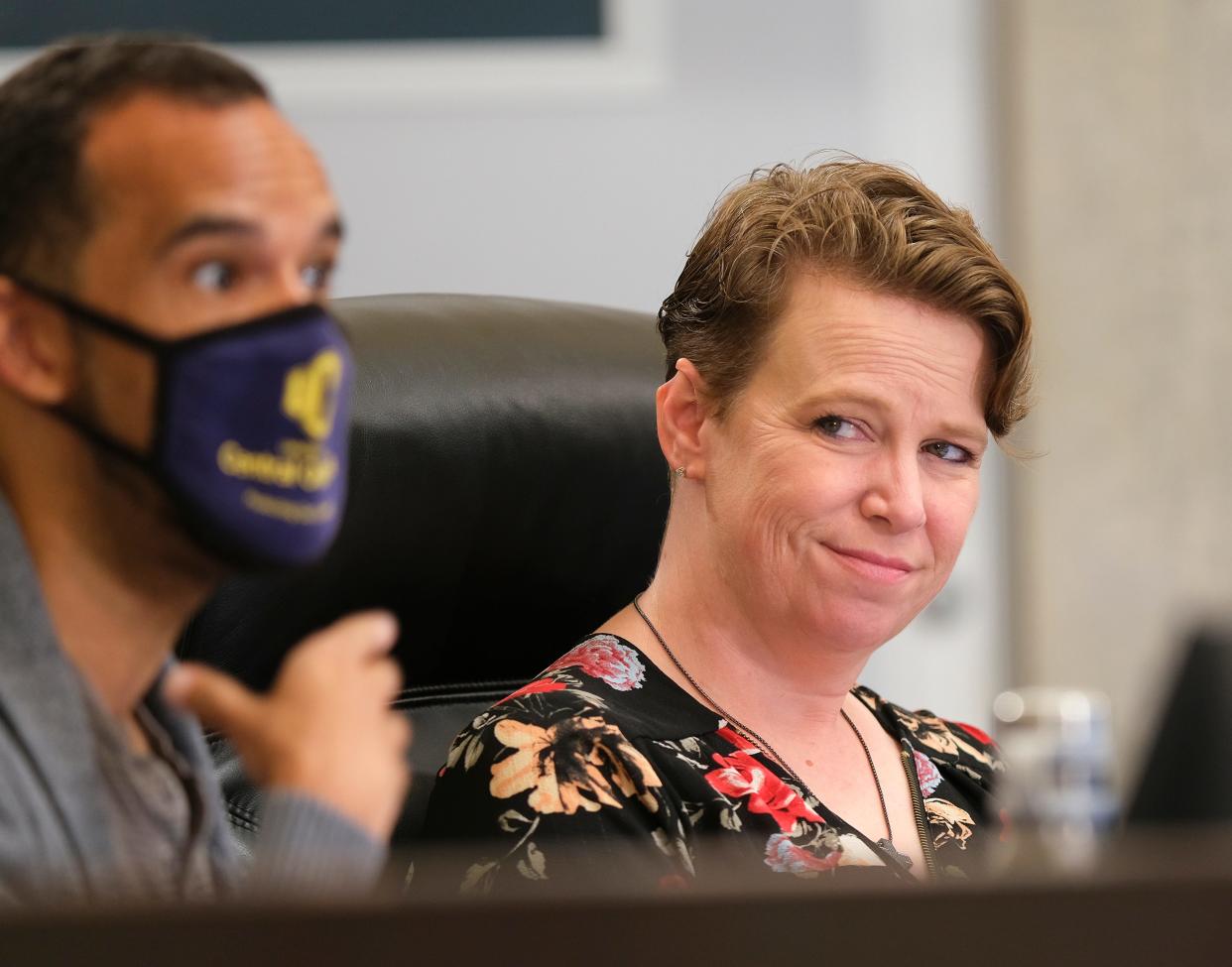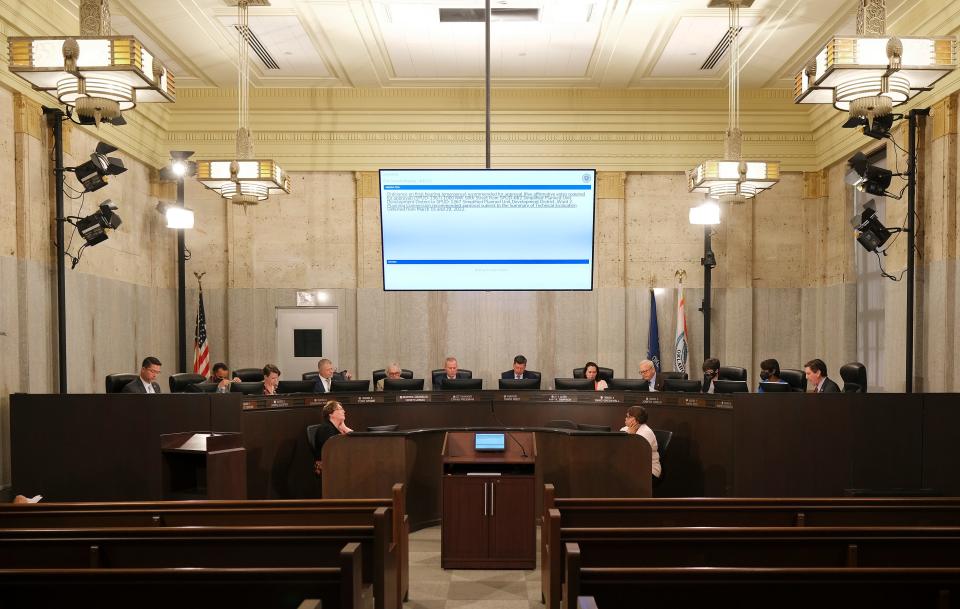Members of OKC Human Rights Commission include councilor who voted against its formation

Community members were appointed to Oklahoma City's newly created Human Rights Commission on Tuesday, with a rare appointment of a city council member as her ward's representative.
Ward 3 Councilwoman Barbara Young chose to appoint herself as the Ward 3 commissioner, a move city council Chief of Staff Debi Martin said she can't remember being done in her 32 years leading the office. Though Oklahoma City Mayor David Holt said there is no rule against it, Ward 7 Councilwoman Nikki Nice questioned the appointment due to Young's vote against establishing the commission in July.
"We have someone who is not even in support of a commission, and now they're being appointed to the commission," Nice said. "Please make that make sense for me."
The commission was approved by 5-4 city council vote in July, after nearly two years of research by a mayor-appointed task force on whether the city needed such a commission. The last Human Rights Commission was disbanded in 1996 when city councilmembers disagreed with commissioners trying to protect the rights of LGBTQ+ residents.
OKC councilwoman appointed to panel she voted against

Young told The Oklahoman she will approach the role as commissioner hoping to ensure timely resolutions for residents experiencing human rights violations.
In a July 19 Facebook post, the day of the vote to establish the commission, Young said she believes these violations do still occur in OKC and that "we cannot do nothing."
However, she said in the post she voted against the commission because she couldn't support its format.
"My concern is that it would delay and potentially prevent our residents from receiving the assistance they need in a timely fashion to resolve a violation," Young said in the post. "There are limitations for how long after an incident a complaint can be filed by state law and adding the city as a layer to an existing process (risks) potentially running out the time."
Young did not respond to a request for clarification on specific concerns with the commission, or how it might delay resolutions, by the time of publication.
While Nice said the appointment was "a grave concern," commission Chair Valerie Couch said she looks forward to working with Young. Couch served on the mayor's task force that studied whether a commission was needed, and is dean emeritus at the Oklahoma City University School of Law.
"I think I can learn from her about her concerns, and help the whole commission think about those considerations," Couch said. "I think that's an important part of our work, is to have those conversations."
When the commission was being considered by the city council, residents in opposition of its establishment said it was an unnecessary form of government overreach.
Marsha Herron, who was appointed by Nice as the Ward 7 commissioner, said some of that resistance may come from a lack of understanding.
"If it's not been your experience to be mistreated, or if it's not been your experience to live in lack and want ... I think it's difficult to understand what that plight is," Herron said. "I can't speak for other people who didn't want it. All I can do is be self-reflective, and ... even if it's not my experience, do I believe that everybody deserves the opportunity to be heard if they've been afflicted or offended in some way? And the answer is, yes."
Commissioners, approved by mayor, intended to be majority minority

The mayor was tasked by the ordinance to make "reasonable efforts" to ensure a majority of the commissioners, eight of which were appointed by each councilmember, were from racial, religious or other recognized minority groups.
Holt said this is the only city commission with individual ward appointments in addition to an overall membership goal.
"Frankly," he said via text, "the two things are in opposition … When nine different people are selecting nine different commissioners, each in a silo, the mayor's hands are tied in trying to reach an overarching outcome."
But he said he was pleased that even with each councilmember working on their own to appoint a commissioner, the commission has representation from Black, Latino, Native, Asian and LGBTQ+ communities. Also, seven of the nine commissioners are women.
Maurianna Adams, who served as co-chair of the mayor's task force, said she and other task force members had no say in the appointments and weren't even aware the appointments were being presented to council Tuesday.
The first round of commissioners were appointed to two- and three-year terms. In the future, all will be appointed to serve three years.
The nine commissioners are:
Valerie Couch, at-large member and chair, term expires September 2025
Ralph Crawford, Ward 1, term expires September 2025
Cindy Nguyen, Ward 2, term expires September 2024
Councilwoman Barbara Young, Ward 3, term expires September 2025
Leslie Shaw VanBurskirk, Ward 4, term expires September 2024
Brian Wall, Ward 5, term expires September 2025
Ana “Deisy” Escalera, Ward 6, term expires September 2024
Marsha Herron, Ward 7, term expires September 2025
Rhonda Hooper, Ward 8, term expires September 2024
What members say the new commission will bring to OKC
Herron, Ward 7 commissioner, said she hopes the new commission brings the city's residents together in new ways.
The commission, which can address complaints related to employment, housing and public accommodations, will offer more people "a seat at the table" and a chance to have their voices heard, Herron said. The discrimination could be based on race, color, religion, creed, sex, gender, national origin, age, familial status, genetic information or disability.
"The hope is that as we look at situations, as we evaluate, we just keep in mind the decency that everybody should be afforded in this life," Herron, who directs Student and Organizational Success for the Oklahoma State School Board Association. "I think you can sleep well at night if you know you had a hand in making sure that everybody was looked after. When it comes to being accountable at the end of my life, that is what I want on my record."
In addition to its task of receiving and investigating discrimination complaints, the commission is required to put on at least one annual public education event, "to educate the public regarding human rights concerns."
Nguyen, appointed to the commission by Ward 2 Councilperson James Cooper, said it will be important to learn from Oklahoma City's history of excluding certain communities in addition to recognizing there are still excluded and vulnerable residents.
"I think the Oklahoma City that some residents get to experience is not the same Oklahoma City that many others do," Nguyen said.
The commission also can recommend policies to the city council, recommend the city council conduct studies or surveys, form advisory committees and will submit an annual report of its activities to the council.
How the Human Rights Commission will address discrimination
Oklahoma City joins Norman, Lawton and Tulsa as Oklahoma cities with human rights commissions. Each receives its authority to address discrimination complaints under the Oklahoma Anti-Discrimination Law, which does not include sexual orientation or gender identity as part of its definition of sex and gender.
The task force recommended adding specific protections for LGBTQ+ residents and giving commissions the authority to provide restoration for discrimination victims to the city's state legislative priorities for 2023.
The commission cannot handle complaints involving a city official or employee acting in their employee capacity, including police officers.
The city soon will seek applications for a paid compliance officer, who will review complaints with a city attorney and determine whether it should be referred to another agency or be investigated by the commission.
An investigation can lead either to dismissal of the complaint or an attempt by the commission to conciliate between the complainant and the accused party. If an agreement cannot be reached, or if the Conciliation Order is broken, the compliance officer can choose to refer the case to an outside agency.
Couch said she wants residents to know the commission is not a legalistic body seeking to punish anyone.
"I think a lot of people think about these commissions almost like courts, where you have a hearing and make a determination," Couch said. "But this ordinance sets up a commission whose power is, in substantial ways, focused on conciliating or mediating disputes."
This article originally appeared on Oklahoman: OKC human rights panel members appointed with controversy

